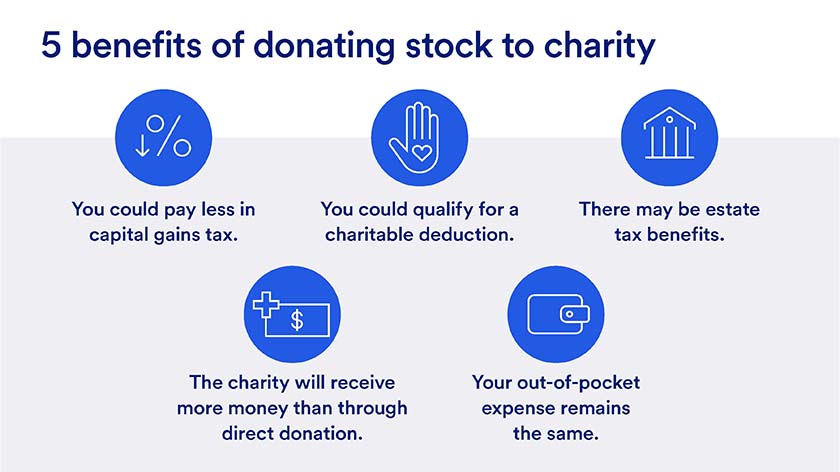Key takeaways
Equity compensation awards often have a low cost basis and significant market value, making them ideal charitable donations.
Gifting stock to charity can reduce your capital gains tax, qualify as a charitable donation and provide estate tax benefits.
There are several rules around donating equity compensation, so it’s important to work with your tax and financial professionals when executing this strategy.
While charities welcome donations from all supporters, gifts from high net worth individuals and families may have a disproportionate impact on an organization’s ability to fulfill its mission. This makes it critical for donors with significant wealth to plan strategically for how they can maximize their charitable donations.
One effective strategy is to donate equity compensation instead of cash. Donors benefit from the tax benefits of donating stock to charity while maximizing the amount of money charities receive.
“Donating appreciated equity compensation provides more resources to charities without increasing the donor’s out-of-pocket expenses,” explains Elliott Stapleton, senior vice president and managing director of wealth strategy for Ascent Private Capital Management of U.S. Bank.
Why donate stock to charity?
Equity compensation awards make excellent charitable gifts, as they often have a low cost basis and significant market value. There may be tax benefits of donating, too:
- Reduction in capital gains tax. By donating appreciated stock directly instead of first selling it and then donating the proceeds to charity, you can avoid paying capital gains taxes on the appreciation.
- Qualification for a charitable deduction. You may qualify for a charitable deduction of the full fair market value of the stock donated, up to 30% of your adjusted gross income (AGI). You could even pass that savings on to the charity in the form of more giving, if you choose.
- Estate tax benefits. According to Stapleton, donating equity compensation may also provide estate tax benefits by removing the value of appreciated equity compensation from your taxable estate.
“In essence, you’re increasing the charitable impact of your donation, because the charity will receive the full value of the appreciated stock, not the value of the stock less capital gains taxes,” says Stapleton. “The strategy may be especially beneficial during years when your income is high, and you want to lower it in order to decrease your tax burden.”
How does a gift of equity work?
Before you incorporate gifting stock into your tax and philanthropic strategy, consider these equity compensation guidelines:
- You must have held the equity compensation for at least one year to realize any tax benefits. If you’ve held it for less than one year, you can only deduct the cost basis of the stock. In other words, you can only deduct its fair market value at vesting or on the date you make the contribution, whichever is lower. To help compensate for this, you can use the deduction to offset up to 50% of your AGI.
- Choosing to donate highly appreciated stock offers greater tax advantages than donating stock with smaller gains. This is because the charitable deduction and capital gains tax savings are larger. Donating stock to the charity provides an asset that has the potential to grow and generate a more significant return over time.
How to gift stock: Types of equity compensation
Equity compensation awards take several different forms, including:
- Nonqualified stock options (NSOs)
- Incentive stock options (ISOs)
- Restricted stock units (RSUs)
- Restricted stock awards (RSAs)
The awards themselves cannot be donated to charity, notes Stapleton. Instead, they must be exercised or vested and the proceeds donated to charity. “If the award isn’t vested, you don’t own it and you can’t donate it,” he explains.
“Donating appreciated equity compensation provides more resources to charities without increasing the donor’s out-of-pocket expenses.”
Elliott Stapleton, senior vice president and managing director of wealth strategy,
Ascent Private Capital Management of U.S. Bank
Some of types of equity compensation awards are better suited to charitable donations than others. The most ideal awards for charitable donations tend to be vested RSUs and RSAs that you’ve held for at least one year after vesting, and exercised NSOs that you’ve held for at least one year after exercise.
You can also use stock received upon ISO exercise that you’ve held for at least one year after exercise and at least two years after grant, and vested RSUs and RSAs. However, there are fewer tax benefits and there may be potential alternative minimum tax (AMT) implications.
As noted above, you generally can’t transfer unvested RSUs and unexercised ISOs and NSOs to charities.
Donating equity compensation to a donor-advised fund
Rather than donating equity compensation directly to charity, a better option might be to donate it to a donor advised fund (DAF). A DAF is a qualified public charity with the resources and experience to evaluate, process and liquidate donated equity compensation, thus streamlining and facilitating the donation process.
According to Stapleton, DAFs are an easy, tax-efficient way to initiate a large charitable donation. One of the biggest benefits is that you can decide later which charity or charities will receive your donation.
“Donors don’t always know which charities they want to support when they make their donations,” Stapleton explains. “With a DAF, you receive an immediate charitable deduction for your donation and can then recommend grants to specific charities in future years if you choose.”
Review equity compensation plan documents carefully
Stapleton recommends that you carefully review equity compensation plan documents to make sure the stock is eligible for charitable donations and identify any potential restrictions.
“Also be aware that these kinds of charitable donations generally must be reported on IRS Form 8283, Noncash Charitable Contributions,” he says.
The tax benefits of donating stock to charity can be appealing, but gifting non-cash assets such as equity compensation to charity requires careful planning and complex financial and tax analysis. Therefore, it’s important to work closely with your tax, legal and financial professionals as you plan and execute this strategy.
Learn how Philanthropic Services from U.S. Bank can help you optimize your charitable giving.
Explore more
Qualified charitable distributions: A smart part of your charitable giving strategy
QCDs from IRAs offer a prime opportunity to enhance your giving and potentially take advantage of greater tax savings.
Bring your charitable giving vision to life.
Philanthropic Services from U.S. Bank serves individuals, families and family foundations, as well as public charities and nonprofit organizations.




